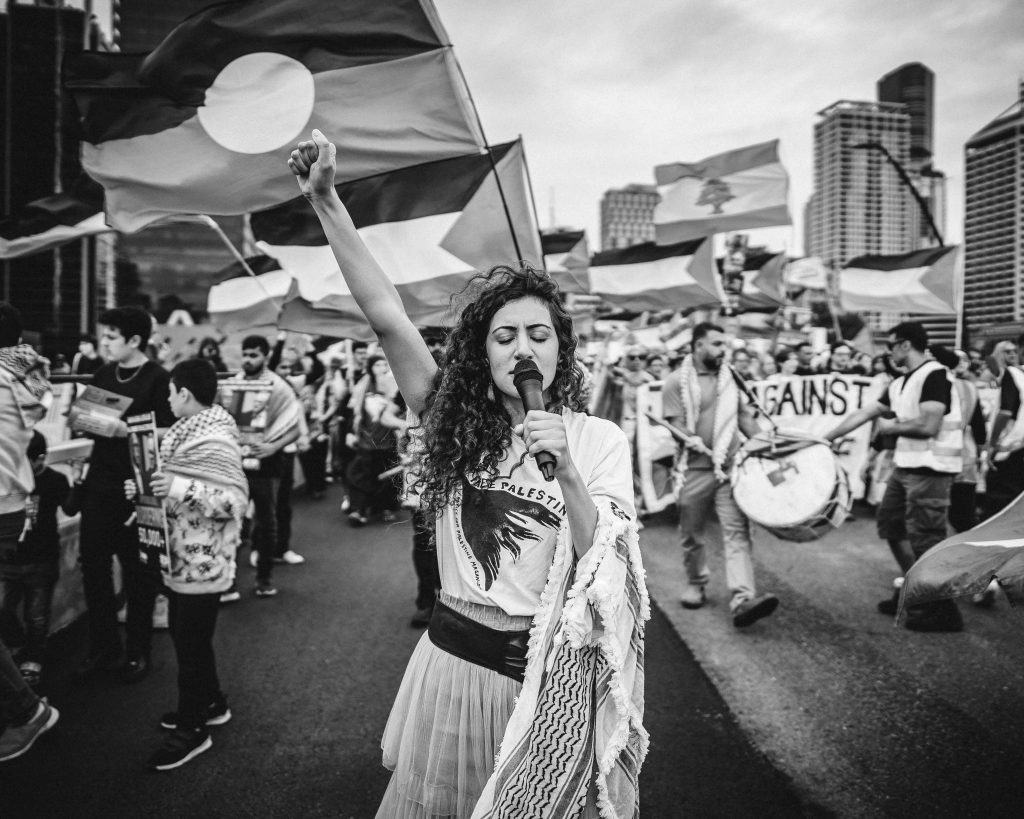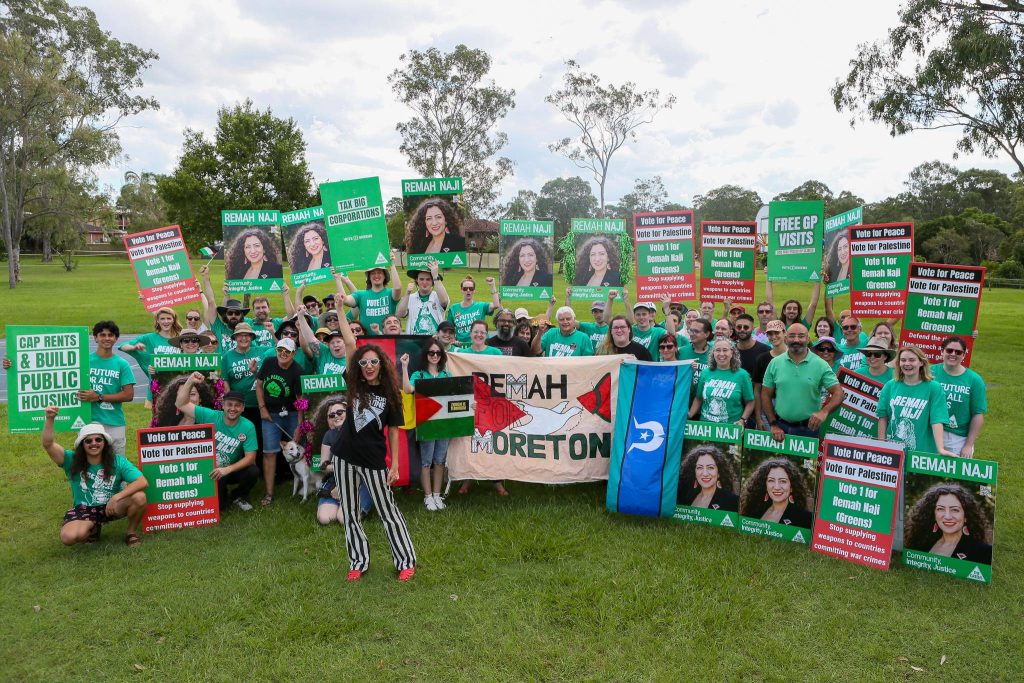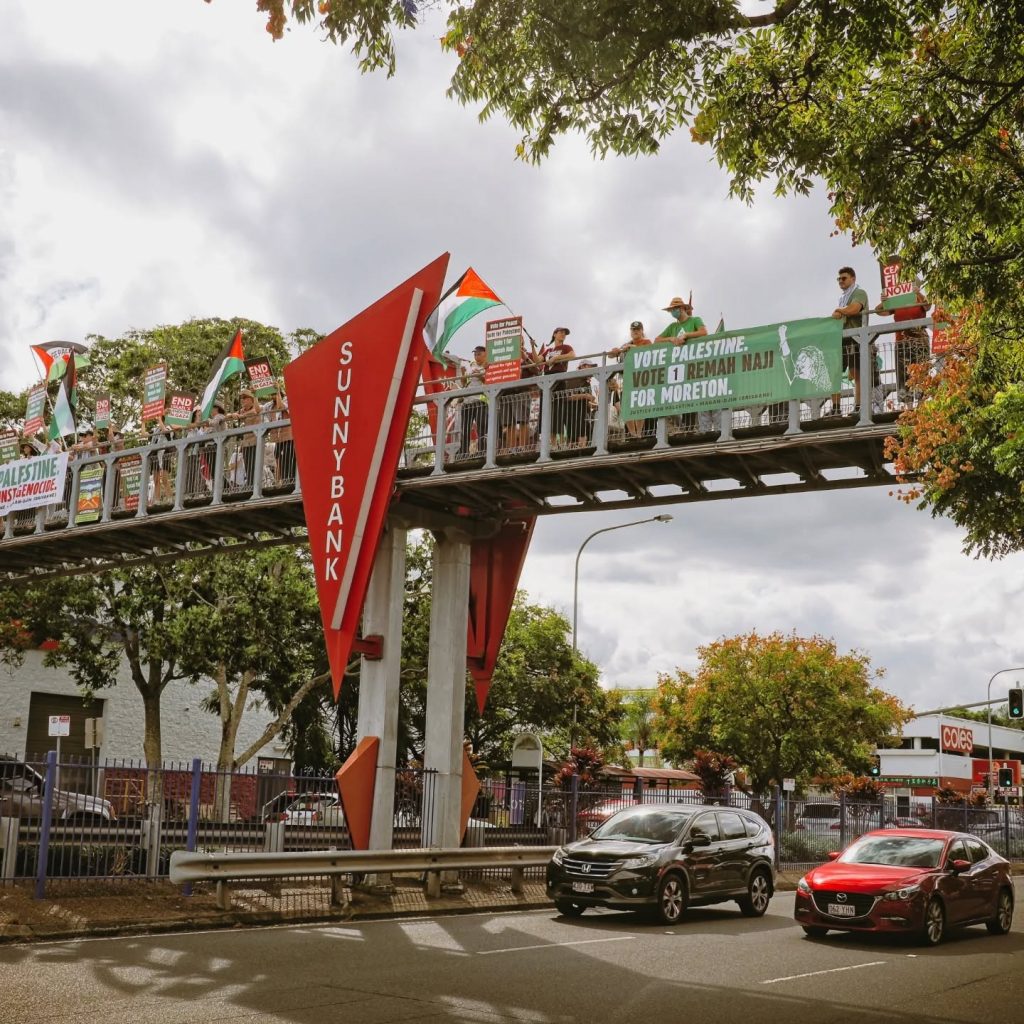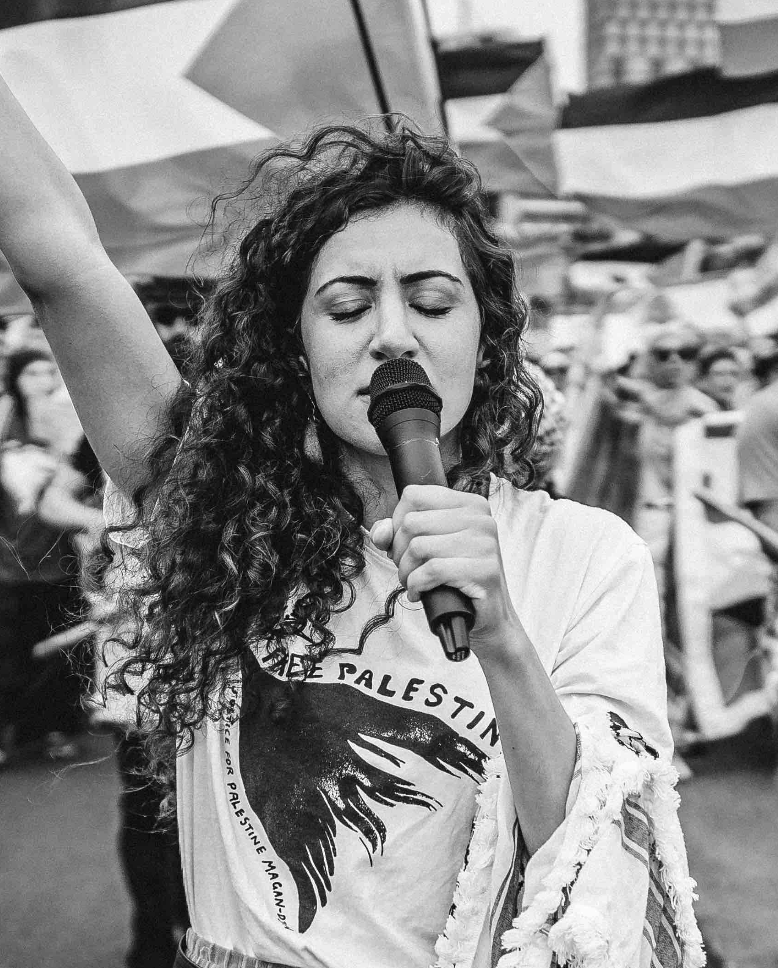Refusing to check her identity at the door, Remah Naji’s campaign for Moreton in Queensland embodied the revolutionary potential of unapologetic existence — against systems designed to exclude Palestinian women and marginalised others. Beyond electoral calculations, Remah’s campaign disrupted settler-colonial frames, transforming public spaces into sites of creative resistance for migrants, communities and the Palestine solidarity movement.
I was still a Labor party branch member when fellow activists suggested I should run as a candidate for the Greens. My initial response was: I ain’t a politician – I belong to the street. But I was already preparing to quit Labor after years of disappointments on a range of issues, and finally tore up my membership in response to Albanese’s ongoing support of Israel’s genocidal invasion of Gaza.
For someone rooted in social justice movements, in deciding to step up as a candidate, the question I grappled with was: Am I betraying the movement? To me: being a member of a political party is one thing, publicly representing the party as a candidate is something else. It’s stepping closer to institutional power, a space movements often challenge. It’s walking a fine line between proximity to power and loyalty to the streets, where real power comes from.
In the end, I decided to run because my movement – the Palestine Solidarity Movement – backed me, along with many other marginalised communities I’m connected to who feel underrepresented and betrayed by our political system. I wanted to challenge the boundaries of our existence as marginalised groups. I wanted young girls in my community – some of whom hide their true identities out of fear or shame – to know that there is another way to live. One grounded in dignity, resistance and hope.

Image credit. Free Palestine One Year by Sean Gilligan.
As the first Palestinian woman to run for Federal Parliament, one of the most satisfying parts of this campaign was refusing to check my identity at the door to earn my place. I didn’t shrink myself to fit the expectations of the political establishment – I stood fully in who I am. I existed unapologetically, and I hope that in doing so, I’ve helped clear the path for other women to do the same.
The experience of running with the Greens reflected the same challenges marginalised women generally face every single day. One of the initial challenges was confronting “the angry Arab woman” stereotype, after a 7:30 segment aired a clip of me protesting the ALP dinner here in Magan-djin. Those who took issue with that clip likely failed to understand the depth of that anger – an anger rooted in lived experiences – which raises deeper questions about the strength of the connection between the Greens as a political party and the social justice movements we claim to align with.
The truth is, many people come to grassroots movements because of anger – anger at injustice, at broken systems, at the repeated betrayals by those in power. But not all anger is treated equally – it’s often Arab women who get reduced to a stereotype. It’s a way to discredit us before we even begin to speak.
This was at the very start of my campaign – the moment I realised that my identity was now tied to the Greens as a political party. Navigating this space deserves an article of its own, but I’ll say this: much like existing in a predominantly white society, I felt the pressure to prove I was a “good bet,” that my identity should be of service to the broader party.
That part sucked, particularly because putting myself forward as a Palestinian woman meant becoming a target. I accepted the risk of being on every Zionist’s radar and the loss of my privacy among other things. I even relinquished my Jordanian citizenship. Sometimes thinking about it makes me wonder how much more of my existence did I have to sacrifice to run this campaign? Above all, I’m grateful I was able to keep my family out of it.
Of course, compromises had to be made. One of our first strategic questions was: How much should we rely on my personal brand vs the Greens brand? My personal brand drew many volunteers from across the city – people who believed in a campaign built around justice and centring the most marginalised.
The Greens brand helped us gain greater credibility, but I was clear from the start: my platform wouldn’t become just another Greens platform. Not because I disagreed – I’m proud of what the Greens stand for – but because election cycles too often sideline the most marginalised, who end up missing out on promises. I did my best to avoid that trap, even knowing that mainstream policies are often more palatable to voters.
Since Moreton is Queensland’s most linguistically and culturally diverse electorate, we had to strike a delicate balance between broad appeal and strong commitment to advocating for minority groups. Greens elected reps and candidates brilliantly echoed the party line and generously dedicated their platforms for Greens messaging. My team and I chose a different path – one that expands the Overton window and pushes for conversations where they were needed most. We campaigned for faster, more affordable family reunion visas, spoke openly about rising fascism and the scapegoating of migrant communities and dedicated ample space to advocate for First Nations sovereignty and Palestinian liberation.
Mainstream concerns do matter – and we incorporated core Greens policies into our platform – but we also knew that truly serving our community meant addressing the issues that often go ignored.
I’ll be honest, we had to debate the photos used in my campaign materials – always asking the question: Will this look too radical? A megaphone, a keffiyeh, a raised first – images tied to justice, but still somehow seen as provocative. My team was proudly bold, yet even we paused, forced to consider how we’d be perceived. Electoral politics has a way of disciplining candidates, but I’m glad to have refused to accept that these truths were too “radical” to be seen.

Image credit. Mega Weekend by Kyra Webb.
Another challenge was balancing advocacy for Palestine with the rest of my platform. There was the fear of being labelled a “single-issue” candidate – but that label rarely sticks to non-Palestinians. That’s not a coincidence; it’s anti-Palestinian racism – another tactic to silence our voices. I internalised it too. I remember filming a video at a Kuraby BBQ where I was asked to speak on Palestine, and I hesitated: Wouldn’t that pigeonhole me? That moment made me realise how deeply these frameworks shape us. If we don’t actively challenge them, we start to see the world through them.
Of course, none of the many challenges throughout the campaign came close to the challenge of watching my people get massacred on the screen while trying to prepare for a candidate forum. Nothing came close to the pain of watching the children’s bones stick out of their bodies while I get ready for another community BBQ. I remember arriving at our final fundraiser sick to the stomach after watching a mother carrying her lifeless child in her arms. None of it made sense. And still, I had to show up – strong, composed, inspiring. I believe I was. Despite and because of the grief. Because the people I come from and the strength they carry every day.
It’s the gift and the curse of belonging to a marginalised group: Strength looks like holding onto hope when everything around us is designed to break it. Throughout my time running for the Greens, I didn’t just speak for myself – I spoke for those forced into silence.
This campaign was never just about winning a seat. It was about refusing to disappear. It was about showing that dignity can still stand tall in the face of devastation. Call me an angry Arab woman, a single-issue person, a street radical – it doesn’t matter. I stood on stages built to exclude people like me, because so many before me never had the chance. I carried their voices with me every step of the way. Whether I’d do it again or not, one thing is clear: we’re done waiting for permissions.
Remah Naji is an education worker, a unionist and a community organiser. A daughter of Palestinian refugees, Remah ran for the Greens in the Federal seat of Moreton to amplify voices of marginalised communities on Brisbane’s southside.
Image credits. Feature image: Sunnybank Vote by Nick Chesterfield. Free Palestine One Year by Sean Gilligan, and Mega Weekend by Kyra Webb. Images courtesy of Remah Naji.


Thank you Remah, for your courage and fearlessness. You inspired so many of us with your unwavering commitment to the marginalised, the voiceless and vulnerable people. You are like a beautiful spark of light that radiates out and up lights everyone around you. Reading this article makes me realise the sacrifices you made and yet stayed firm in your integrity and values of inclusion and justice. I remember seeing you bend down to eye level with a child at that final fundraiser and thinking, wow this woman is fully present with everyone she meets. Such a beautiful human quality. Thank you so much Remah. We will never stop fighting for the Palestinian people, in our thousands in our millions, we are all Palestinian. Much love and solidarity 🙏🏼💖🍉🇵🇸🕊️ oh and happy mother’s Day 💖🌹🫶🏼
So true- no matter how tired you were Remah, you greeted each supporter with equal enthusiasm and respect. You turned up to support the homeless and marginalised, the oppressed and you have never stopped fighting for Palestine. I remember the first time I met you at the MFP market and apologised to you for all the harm done in thr name of jewish communities to which I once belonged – and you thanked me for my support with no hesitation. You dissolve the stereotypes, you challenge prejudice, and lead us here in Majandjin in the fight for a.Free Palestine and freedom of all people from oppression
I’m curious as to why you stayed so long as an ALP member? I gave up voting for Labor a long time ago because of their policy of putting refugees on island gulags, voting to change the definition of refugees and more. I decided that the Greens had the only humane social justice policies.
I joined the Greens 6yrs ago. I was never a member of Labor as many have been. So I’m struggling to understand why someone from a refugee background would even be a member of that party.